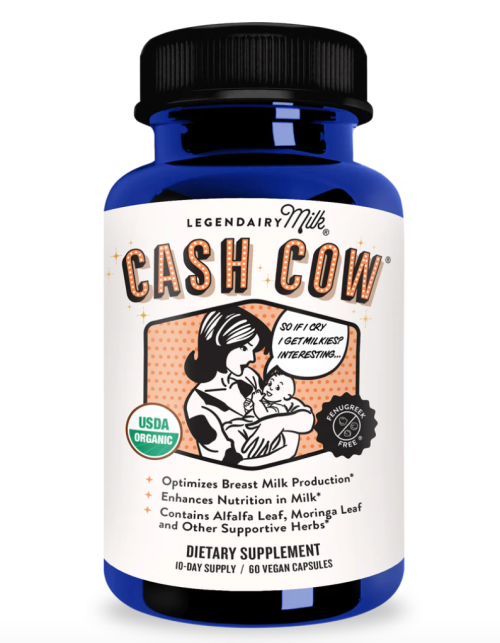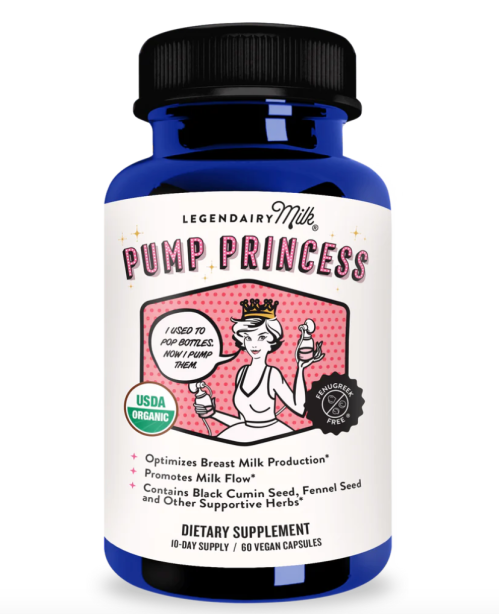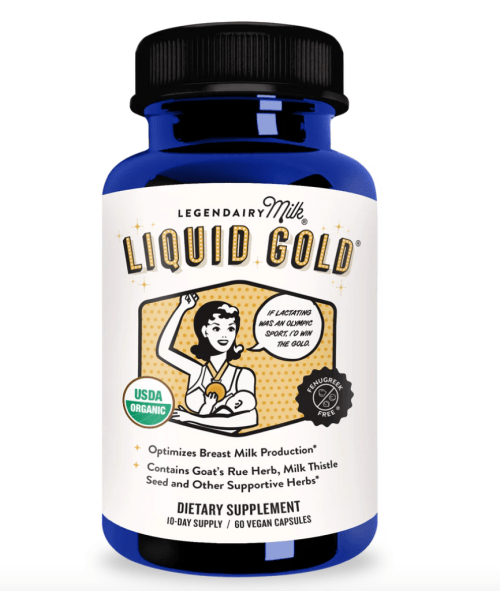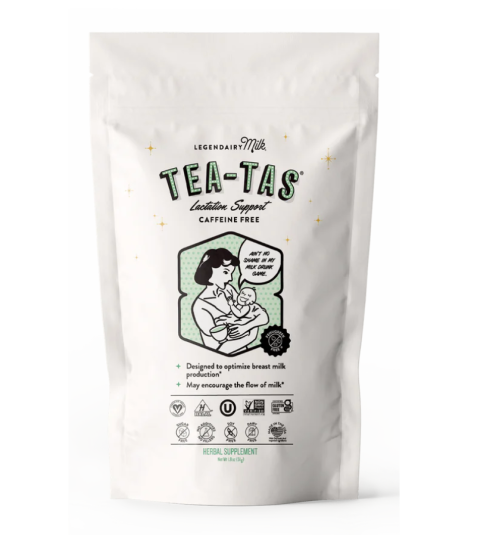Our editors independently select these products. Making a purchase through our links may earn Well+Good a commission
Breast or chestfeeding can be a beautiful bonding experience with your baby. But it can also bring up some anxieties for some people—one of them being about keeping up milk supply.
Experts in This Article
international board-certified lactation consultant and care manager at Boram Care
Rest assured: Most people make just the right amount of breastmilk to meet their baby’s needs, according to the U.S. Department of Agriculture (USDA). You heard it here; you don’t need a freezer full of milk to successfully breastfeed.
Still, your milk supply can be fickle at times. One day you’re overproducing and the next you’re barely getting enough. “This is common and normal,” says Melissa Kotlen, IBCLC, RN, an international board-certified lactation consultant, registered nurse, and care manager at Boram Care, a postnatal care center. “Supply dips at many different times during the breastfeeding/pumping journey.”
You may make less milk for reasons beyond your control, like night weaning, but other times, it might be related to something you’re doing unintentionally. Whatever the reason, there’s usually a way to replenish your milk supply. Here, we’ll take a look at common habits that can halt milk production and ways to get your milk flowing again.
Not eating enough calories
A lot of people feel pressure to “bounce back” after pregnancy (which, for the record, is totally unfair and unrealistic in our book), so they rush to lose the baby weight by cutting calories. But restricting your diet can unintentionally decrease your milk supply.
You actually need more calories while you’re nursing than when you’re expecting. People that exclusively breastfeed burn about 500 extra calories above their baseline per day, according to the American College of Obstetricians and Gynecologists. This means it takes a lot of energy to make milk. So if you start to dip below 2,000 calories per day (you may need even more than that), your supply will likely take a hit, says Kotlen.
What to do instead
“Eating nutrient-dense, caloric foods is very important,” says Kotlen. Lean proteins, healthy fats, whole grains, veggies, and fruits are all great options as they give you the energy and nutrients you need to produce milk.
And you don’t need to make fancy meals (I mean, who’s got the time?). As long as they’re well-balanced, you can even nibble on simple-to-make snacks like an apple with nut butter, mozzarella cheese and whole grain crackers, a hard-boiled egg with veggie sticks, etc. Kotlen likes this strategy, too: “I’m a big fan of grazing throughout the day—it’s often more realistic than sitting down to three square meals after having a baby.”
If you’re exercising after the six-week mark, you’ll also have to make sure you’re replacing the calories you burn, she adds. Keep in mind, every person’s caloric needs are different. Kotlen recommends using the Dietary Reference Calculator through the USDA (which factors in whether you’re lactating and how active you are) to help calculate a rough estimate of how many calories you need per day.
Of course, if you’re unsure about how many calories to eat while breast or chestfeeding, talk to your OB/GYN or consider working with a registered dietitian who has experience counseling postpartum people.
Not drinking enough water
Eating enough food is only one part of the equation. If you want to sustain your milk supply, you also have to drink plenty of water. That’s because, apart from fat, protein, and lactose, breastmilk is 87 percent water, according to a May 2016 article in Nutrients1. Simply put, you need to drink water to make enough milk for your baby. If you’re dehydrated, your supply may go down.
What to do instead
A good rule of thumb is to drink at least half of your pre-pregnancy body weight in ounces per day, says Kotlen. If water isn’t your fave, you can sip on other clear fluids like coconut water or drinks like unsweetened teas. Kotlen also likes hydration supplements, which can help you replace electrolytes.
If you forget to drink water, or you’re just too busy to sit for a minute (because, postpartum life), try sipping on a glass every time you nurse as a reminder to hydrate. And of course, always listen to your body’s thirst signals. If you’re feeling thirsty, especially while nursing, your body’s trying to tell you that you need more water to keep up supply, i.e., “nature’s way of doing its job,” says Kotlen.
Not nursing or expressing often enough
When you first start nursing, you might not realize how frequently you have to feed your baby to keep your milk supply strong. Hint: It’s probably more often than you think.
“Breastmilk production is a supply and demand story,” says Kotlen. “The more you stimulate and express, the more you will produce.” The opposite is true, too. If you avoid nursing or pumping (who hasn’t skipped an overnight pump session?), your body will pick up on these cues and learn that it doesn’t have to produce as much milk, she adds.
What to do instead
Try to express milk (through direct feeding or pumping) as frequently as your baby eats. This can be around 8 to 12 times per day (or more) in their first month of life, depending on your baby’s patterns and cues, per Nemours KidsHealth. Ultimately, it’s best to follow their lead when it comes to feedings in order to maintain your milk supply.
Supplementing with formula
At some point in your nursing journey, you might decide to give your baby a little formula. There are a million reasons why you might supplement with formula, and all are valid. Just know that if you’re supplementing with formula on a regular basis, and not pumping or nursing as much, it will affect your milk supply.
Again, it’s all about supply and demand. If your body senses that you’re nursing less, it’ll start making less milk. When you give your baby a bottle of formula, you’re likely skipping a feeding or pumping session, so your body thinks it doesn’t need to produce as much milk, says Kotlen.
What to do instead
While a random formula feed here and there won’t kill your natural supply, consistent formula feeding likely will, says Kotlen. If you want to keep giving your baby breastmilk, try to supplement less and nurse as much as possible. Ultimately, though, Kotlen says to do what’s best for your family—whether it’s breastmilk, formula, or a combination of both.
Being overly stressed
You’ve just had a newborn. You’re barely sleeping, your hormones are out of whack, and you’re trying to navigate being a new parent. This is a recipe for stress. One February 2022 study in Clinical Therapeutics found that stress may be associated with impaired lactation, but better and more robust studies are needed to prove this connection. (But on a broader scale, we know that stress can have a negative effect on your health overall, whether you’re nursing or not.)
What to do instead:
“Take any help you can get,” says Kotlen. “Ask your partner to take the baby for a walk while you take a nap, or ask family or friends to pitch in for extra sets of hands.” It really does take a village, so don’t try to do everything on your own.
Practicing self-care and relaxation are also essential stress-relievers. For example, meditating—even for a minute or two per day—can make a big difference in your mental health.
If your stress level is through the roof, and you’re overwhelmed or burned out, reach out to your OB/GYN or a mental health specialist, says Kotlen. They can help make sure you’re not dealing with more serious conditions like postpartum depression or anxiety, and help you get the tools you need to cope. Again, becoming a parent is hard; you shouldn’t have to bear the burden alone.
Not getting enough sleep
While sleep deprivation in the newborn phase is challenging, those midnight feedings are actually quite normal and important for sustaining milk supply. This doesn’t mean you won’t potentially feel the effects of poor sleep during the day—including increased stress levels, which as we’ve learned, can be associated with impaired lactation. But again, more research needs to be done on the topic.
What to do instead
Even if the sink is full of dishes, and there are five loads of laundry to do, try your best to prioritize sleep. In the early days, “napping when the baby naps is ideal to get in a few hours of sleep,” says Kotlen. But if that’s impossible, “even shorter power naps can also help tremendously,” she adds. Regular short stints of shut-eye can help you recharge your battery and keep your breastmilk in steady supply.
“If you’re not a napper, just lying down in a quiet, dark room will have a similar effect,” says Kotlen. So can a warm, relaxing bath—though most providers suggest you wait on this until you’re at least six weeks postpartum (or once you’ve been cleared by your doctor to do so).
“Napping when the baby naps is ideal to get in a few hours of sleep. Even short power naps can help tremendously.” —Melissa Kotlen, IBCLC, RN, lactation consultant
Not taking care of your health
“As a general rule, getting a cold or flu will not decrease your supply,” says Kotlen. But the symptoms that accompany illness—including fever, vomiting, and diarrhea—can temporarily tank your supply.
When you’re losing fluids (through sweat, vomit, or excessive poop), your body loses nutrients, and you can become dehydrated, says Kotlen. And as we’ve learned, dehydration can decrease your body’s breastmilk production.
You may also lose your appetite when you’re sick, which affects how many calories you’re getting, thereby reducing milk supply.
What to do instead
If you get sick, try to replenish your electrolytes as best as you can, says Kotlen. Your body needs electrolytes like sodium, potassium, magnesium, and calcium to function properly. To keep them balanced, “sip on Gatorade or Pedialyte (don’t chug or gulp!) and eat bland, salty foods like Saltine crackers with plain broth,” adds Kotlen.
Doing your best to prevent illness is also important here, so make sure to stay up to date on all vaccines, including the flu and COVID-19 vaccines, which are safe and effective for chest- or breastfeeding people.
And even though you’re under the weather, continuing to feed your baby from the breast or pump can keep your milk flowing, says Kotlen. While you may feel fatigued, it’s totally okay to nurse when you’re sick. In fact, it might even help build your baby’s immune system. Here’s how: Sometimes when you make antibodies against a certain virus or infection, they will pass on to your baby through the breastmilk, according to Unicef.
Lastly, if you have to take any medication to treat your illness, always talk to your doctor or baby’s pediatrician to see if it’s safe to nurse.
Taking certain medications
“For the most part, medications should not have an affect on milk supply,” says Kotlen. But there are a few common drugs that can, including the following:
- Cold medications with pseudoephedrine. Over-the-counter cold medicines like Sudafed, Zyrtec-D, Claritin-D, and Allegra-D all have pseudoephedrine—a nasal decongestant. While pseudoephedrine might help relieve a stuffy nose, the drug can dry up your supply, says Kotlen. It’s not clear why, but some theorize pseudoephedrine can suppress your body’s production of prolactin—a hormone that’s necessary for lactation.
- Birth control pills with estrogen: During lactation, estrogen drops, and prolactin rises, says Kotlen. So if you take a pill with estrogen, you may experience a decrease in milk supply.
- Fertility medications like Clomid: Clomid (a drug that stimulates ovulation, i.e., helps your body produce an egg) can negatively affect milk supply, says Kotlen. Like pseudoephedrine, the drug may also lower your prolactin levels.
What to do instead
Talk to your doctor or pharmacist about other medications that do not affect milk supply. For example, when it comes to postpartum birth control methods, you have options like the mini pill (which is progestin-only), so it won’t mess with your milk production, says Kotlen.
Drinking too much caffeine
Hate to break it to you, but your coffee obsession could affect your milk supply. Caffeine is a diuretic, meaning it makes you pee. When you drink it in large amounts, you may lose a lot of fluid and get dehydrated.
While the amount of caffeine in one cup of coffee (about 100 milligrams) won’t lower your milk supply, drinking multiple cups per day might, says Kotlen.
You may also make less milk if your baby is sensitive to caffeine and rejects your milk, she adds. If your little one is having a reaction to caffeine, they might also have trouble sleeping after feeding. Usually, younger babies are more sensitive to the stimulant in breastmilk, according to Johns Hopkins Medicine.
What to do instead
Enjoy your coffee in moderation. It’s safe to sip about 200 milligrams per day (approximately two 8-ounce cups of coffee) while nursing, per Johns Hopkins Medicine.
If you suspect your baby’s sensitive to caffeine, you may want to limit your intake. Or you can try adjusting the timing of feedings, like nursing before you have your morning cup, for example, says Kotlen. Just keep in mind that caffeine has a half-life of up to five hours, according to the American Academy of Sleep Medicine, which means it can take up to five hours for half of it to pass through your system.
Eating too much peppermint or spearmint
There isn’t as much evidence to support this one, but many people consider both peppermint and spearmint to be anti-galactagogues—i.e., a food that stops breastmilk production, per Kotlen. Historically, people have eaten peppermint when they want to stop nursing.
But a paper from the National Library of Medicine’s database LactMed states no clinical trials have been found that show it causes lactation suppression. If anything, the paper states menthol—the natural chemical in mint—was only found to suppress milk production in cell cultures and mice.
What to do instead
A cup of mint tea once in a while will not adversely affect supply, but menthol and peppermint in high doses may have the potential to affect it. To be safe, Kotlen says to steer clear of any teas, foods, or candies with a high mint oil concentration. She calls out Altoids as a possible no-no (you might have to find other ways to freshen your breath, sorry!).
Sleep training or night weaning
Newborn babies need to feed overnight, but once they reach four to six months, they can go longer stints without eating. Once this happens, you might notice a change in your milk supply.
“As babies learn to sleep longer stretches at night (I promise they all eventually go 12 hours!), your body will learn that it doesn’t have to produce at that time,” says Kotlen. “You won’t lose your supply as this happens, but it might decrease slightly.”
What to do instead
In this instance, there’s really nothing you can do but relax. “This is a natural course of events, so if your baby is sleeping through the night, take it as a win,” says Kotlen. Take into account, though, your body might need a little time to adjust to dropping overnight feeds, she adds. At first, your breasts will still fill with milk as your body anticipates feeding your baby. And, real talk, this can be a little uncomfortable (your breasts may hurt and even feel a little hard).
The good news is this is temporary. You should feel better once your body catches on to the new feeding schedule. In the meantime, Kotlen recommends applying ice packs for the discomfort.
Avoid using topicals like CaboCreme—a cream formulated with concentrated cabbage extract. While it works wonders to relieve engorgement, it also decreases your milk supply. So save the cream until you’re ready to wean.
Other things that can affect your milk supply
Other factors, which may be beyond your control, can also sap your milk supply. Here are just a few, according to Kotlen:
- A tongue tie in your baby’s mouth (which can restrict their range of motion, per the Mayo Clinic), or a poor latch on your nipple
- The return of your menstrual cycle
- Nursing strikes during teething
- Introducing solid foods
- Breast surgery
How to increase milk supply
If your milk supply has taken a dip, don’t panic. Follow these tips to help strengthen your supply:
Feed or pump frequently
Try to nurse or pump every two or three hours to rev up your body’s milk supply, says Kotlen. Pumping or expressing milk frequently between nursing sessions (and when you’re away from your baby) will also stimulate your body to produce more milk, per the USDA.
Consider pumping after each feeding
Try to pump after each time you feed your baby, to help remove any extra milk during that session. Your body will think your baby is eating more, and therefore produce more milk, per the USDA. Be sure to also keep pumping until your flow of milk has slowed significantly.
Avoid bottles in the early weeks
Babies have to learn to effectively remove milk from the breast, which takes more work than from a bottle. Because a bottle is easier, your baby may start to prefer it over your breast, which can make it harder to build your own supply naturally. So whenever possible, feed your baby from your breast, per the USDA.
Massage your breasts before feedings
Massaging your breasts, using a warm, wet compress or showering can encourage your milk to let down, per the USDA.
Try power pumping
This technique can trick your body into producing more breastmilk. It stimulates cluster feeding—when a baby feeds more frequently, typically during growth spurts. This increased demand will signal your body to produce more milk. Power pumping follows the same principle.
Here’s how to do it: Pump for 20 minutes on, 10 minutes off, 10 minutes on, 10 minutes off, and 10 minutes on, twice a day for one week, says Kotlen. This is a lot of pumping (we know), but make it a little more relaxing by setting a timer while watching TV or reading a book.
Eat a nutrient-dense diet
When you’re nursing, you’re still eating for two. You need enough vitamins and minerals to support you and your baby. Try to eat nutrient-dense foods like lean proteins, plants, healthy fats, and whole grains, to give you energy and maintain a strong supply.
While there’s no hard evidence certain foods can boost milk production, some believe eating oatmeal and brewer’s yeast can help. Both have essential vitamins, so it doesn’t hurt to try. Kotlen recommends this lactation cookie recipe by How Sweet Eats that has both. Lactation cookies made with fenugreek are also thought to increase milk production, per UT Southwestern Medical Center.
Try other milk-producing products
Though research is limited, some people swear by lactation supplements, teas, and cookies to keep their supply high. Kotlen recommends Legendairy Milk’s Cash Cow, Pump Princess, and Liquid Gold. Each has a blend of herbs to optimize breastmilk production. She also likes Legendairy Milk’s Tea-Tas—an herbal lactation tea made with ixbut leaves, a plant traditionally used in Guatemala for its breastmilk-boosting benefits.
Always talk to your OB/GYN or midwife before you start a new supplement or take any herbs, to make sure they don’t interact with any medications you’re taking or health conditions you have.
Legendairy Milk's Cash Cow — $19.99
Legendairy Milk's Pump Princess — $19.99
Legendairy Milk's Liquid Gold — $19.99
Legendairy Milk's Tea-Tas — $19.99
When to see a lactation consultant
Your milk supply depends on so many factors, and there’s aways a reason behind a dip, says Kotlen. While some nursing issues can be managed with a little trial and error, others are beyond your control (like a baby’s tongue tie). If you’ve tried to solve the problem on your own without success, it can be frustrating. But don’t get discouraged; help is available.
Many people benefit from working with a breastfeeding medicine doctor and/or international board-certified lactation consultant, or IBCLC. IBCLCs are experts in lactation who can be helpful to anyone who’s breast or chestfeeding and needs a bit more support. They’ll take your medical history and help you figure out what’s going on. Whatever the issue, they can help you form a plan to increase your supply.
Not sure how to find a good IBCLC near you? The following organizations can help you locate IBCLCs in your area:
- International Lactation Consultant Association (ILCA)
- The United States Lactation Consultant Association (USLCA)
- La Leche League International
- The Lactation Network (which has virtual options)
- Boober
- Zip Milk
- Nest Collaborative
—medically reviewed by Andrea Braden, MD, OB/GYN
Martin CR, Ling PR, Blackburn GL. Review of Infant Feeding: Key Features of Breast Milk and Infant Formula. Nutrients. 2016 May 11;8(5):279. doi: 10.3390/nu8050279. PMID: 27187450; PMCID: PMC4882692.
↩︎
Sign Up for Our Daily Newsletter
Get all the latest in wellness, trends, food, fitness, beauty, and more delivered right to your inbox.
Got it, you've been added to our email list.














